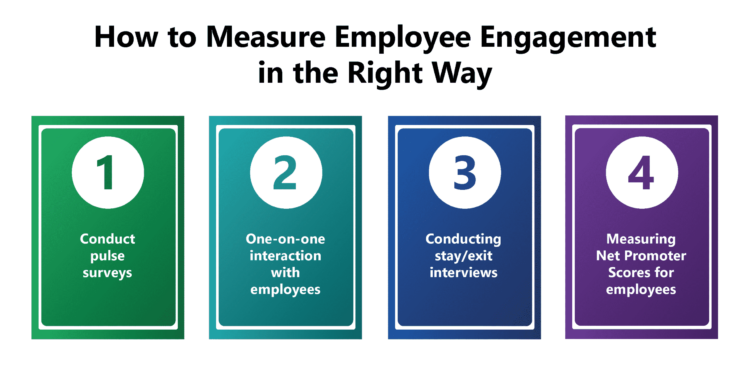1. Importance of Measuring Engagement: Measuring employee engagement helps organizations assess the effectiveness of their engagement strategies, understand employee needs, and make necessary adjustments to enhance motivation and retention.
2. Challenges in Defining Engagement: Organizations face difficulties due to the varying definitions of engagement, which range from employee satisfaction to commitment, making measurement complex.
3. Use of Diverse Measurement Strategies: Effective engagement measurement can be achieved through pulse surveys, one-on-one interactions, stay and exit interviews, and employee Net Promoter Scores (e-NPS).
4. Regular and Transparent Feedback: Frequent surveys and open communication help organizations stay informed about employee sentiments, enabling them to address concerns and enhance the work environment promptly.
How to Measure Employee Engagement in the Right Way. For several years, organizations have focused on improving employee engagement through various initiatives and strategies.

Although such initiatives require time and effort from the organization, they can have a positive impact on performance, productivity, and retention rates.
However, organizations often fail to get the desired results even with excellent employee engagement strategies.

While organizations develop effective engagement strategies, they generally do little to measure the results of these strategies and take corrective action.
Hence, organizations must understand that measuring employee engagement is as essential as developing strategies.

Employee engagement seeks to foster an environment where employees are motivated to contribute to organizational success.
Measuring employee engagement helps organizations understand whether or not their strategies are working.

It helps managers to get a better understanding of employee needs.
However, measuring engagement is not as easy as it may seem. Hence, organizations often feel challenged when designing their processes.

Today, the biggest hurdle faced by organizations in measuring engagement is the lack of a single clear definition for the same.
Every organization defines engagement differently.
Most organizations associate it with employee happiness, satisfaction, fun at work, and even the commitment to goals.
There is no single perfect way of measuring employee engagement.
Despite the challenges, measuring employee engagement correctly using the right strategies is possible.
Here are a few such strategies that can help organizations gain a better understanding of employee motivation and engagement levels:
1. Pulse Surveys
2. One-on-one Interaction with Employees
3. Stay/ Exit Interviews
4. Net Promoter Scores for Employees


Pulse surveys are short, frequent surveys that help organizations stay updated about the office atmosphere.
These pulse surveys are generally quite simple; employees can complete them in a matter of a few minutes.
They typically consist of 5-10 questions to gauge employees’ feelings about their work environment and the changes they would like to see.
Apart from conducting these surveys regularly, organizations should maintain the anonymity of responses to elicit sincere views.

Most organizations only encourage one-to-one meetings between employees and supervisors during performance appraisals.
However, studies have shown that frequent one-to-one interactions between employees and managers can be an effective way of measuring engagement.
These informal chats can open up channels of communication and help supervisors understand what employees are thinking and feeling.

While most organizations follow the policy of conducting exit interviews, they rarely conduct regular stay interviews with their employees.
These exit interviews provide valuable insights into what organizations could have done better to improve employee retention.
On the other hand, stay interviews help them learn what is working well and what is not.
Hence, these interviews should focus on why employees decide to leave or stay with the organization.

Net Promoter Scores (NPS) measure customer satisfaction and loyalty.
However, organizations now use the tool to gain similar information about their employees.
Employee NPS involves asking the employees about their likeliness to recommend the organization as a preferred workplace to their friends.
The responses are ratings on a scale of 0 to 10. The number of respondents who give ratings between 0 and 6 is the detractors.
Those who give ratings of 9 or 10 are termed promoters. The NPS calculation uses the formula: Employee NPS = (promoters — detractors) / total respondents.
A negative NPS score indicates poor engagement levels, and a positive score indicates high engagement.
Organizations should measure employee engagement in the right way. It can go a long way in enhancing employee productivity leading to greater business impact. The above best practices can help organizations in making the measurement process simpler and more effective.

Lead author: Sagar Chaudhuri, the Co-Founder and CEO of HiFives. He is an HR Tech Evangelist with over 25 years of experience in both corporate and entrepreneurial settings. Previously, Sagar has held leadership roles with companies such as Genpact, Infosys, and ICICI Bank. He has an engineering degree from IIT Kharagpur and an MBA from IIM Lucknow. Connect on LinkedIn
To stay updated on the latest HiFives blogs, follow us on Twitter (@MyHiFives)